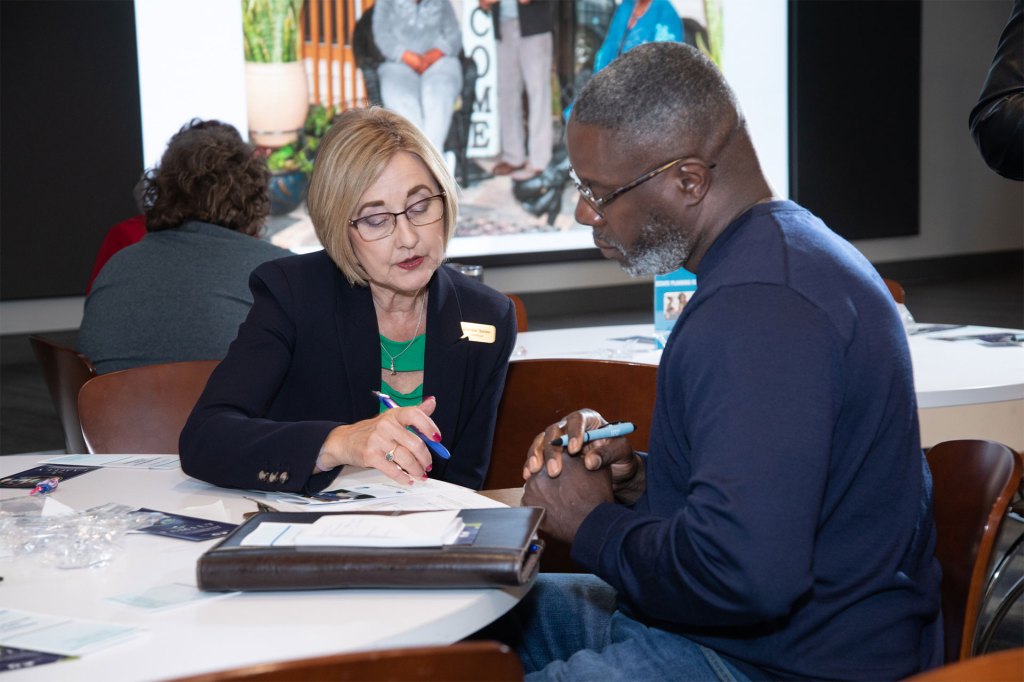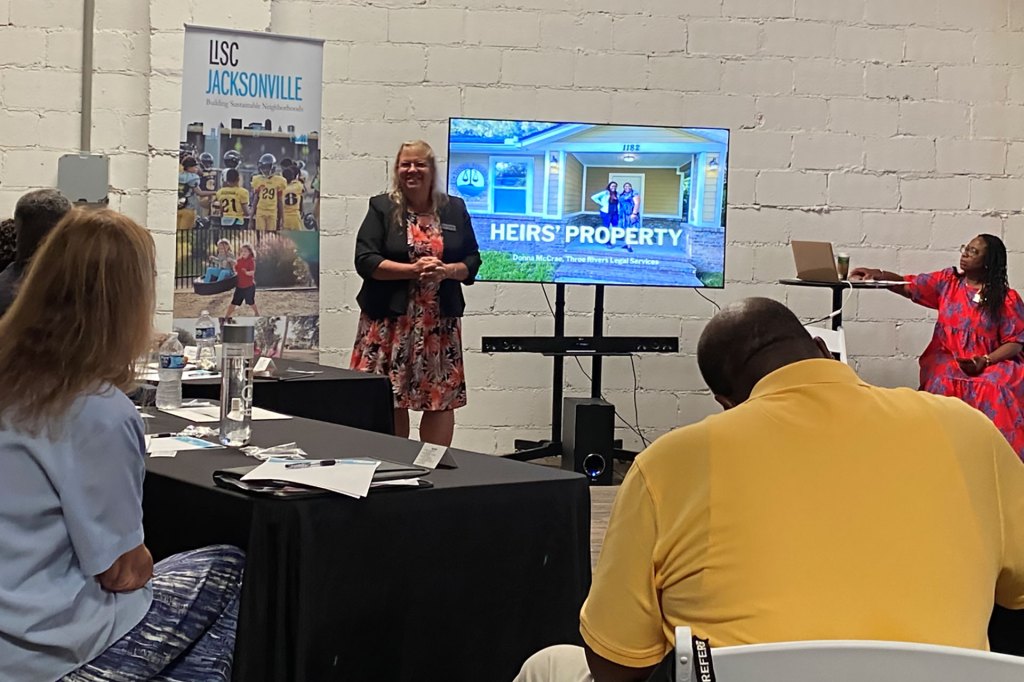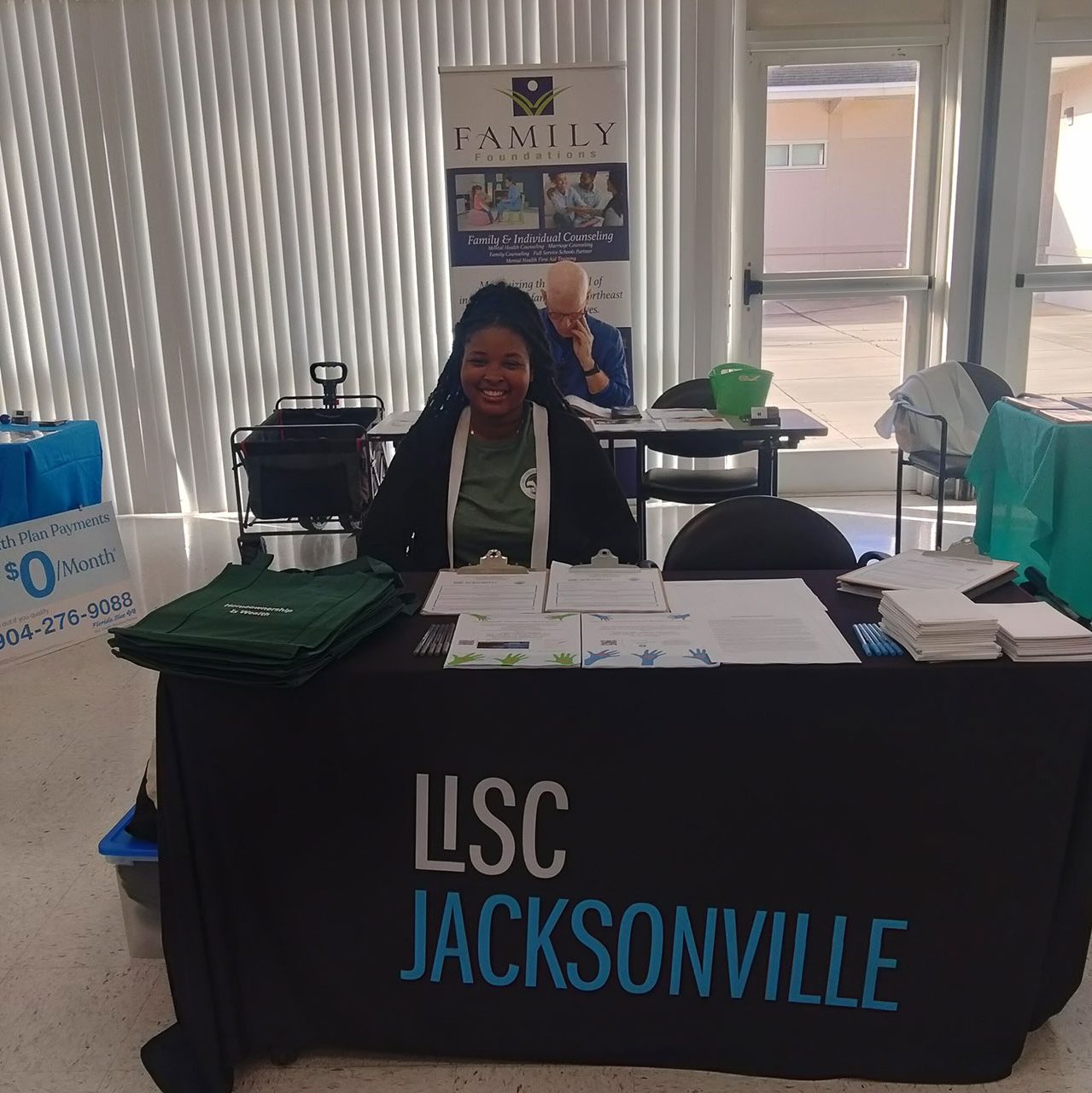Natavia lives in the 800 square-foot family house her grandmother bought on the east side of Jacksonville, Florida almost 80 years ago. Natavia is the third generation to call the property home.
“I value the house for the memories,” she said. “I grew up spending the summers with my grandma, hearing the stories of her walking to work way on the other side of town, just to have a home.”
At 40 years old, raising two children while working and attending college, Natavia expected to own that house by now. She’s lived there for the last 15 years, paying monthly rent to her father and covering the cost of the aging home’s needed repairs. Recently, though, Natavia learned that she cannot get ownership rights to her home.
When her grandmother died without a will, the home’s ownership passed along to her children by default per state law. Without any legal documentation from Natavia’s grandmother about which child would inherit it, each now has an equal ownership share. Natavia’s father would like to leave ownership of the home to her after he dies. But if his siblings don’t agree, that can’t happen.
Natavia’s home is what’s known as heirs’ property. Real estate can become heirs’ property when the owner dies without a will or estate plan in place. It can also happen when someone who does have a will leaves property to multiple people without specifics.

“I value the house for the memories,” she said. “I grew up spending the summers with my grandma, hearing the stories of her walking to work way on the other side of town, just to have a home.”
– Natavia, property heir and community advocate
A family home in jeopardy
Heirs’ property often affects families with fewer financial resources. The property may be one of the family’s most significant assets, but having multiple heirs as owners makes it difficult and expensive to maintain the property or unlock its value. This type of ownership situation also tends to spark family disagreements over how to handle the property.
“It was always verbally understood in the family that my dad would own that house,” said Natavia, whose last name is being withheld to protect her family’s privacy. “But he’s one child out of two other siblings.” Without agreement among all three, one of them cannot pass it along with full ownership rights to any one of their children.
Now Natavia faces losing the home she thought would be hers. She cannot afford the cost of market rate rent or a mortgage on a home elsewhere in Jacksonville. She has no financial share of the home that she’s helped to pay the property taxes on and used her own earnings to fix up over the years.
It’s as if Natavia has performed many of the duties of homeownership, and yet has none of the equity to show for it. She worries, too, that the home her grandmother worked hard to buy is now at risk of slipping out of the family’s grasp.
“I really don’t want all of her sacrifices to go in vain,” Natavia said.
Billions of dollars in family wealth may be at stake nationwide
Natavia is not alone. Recent estimates suggest over 500,000 properties across the country could be stuck in similar limbo, with $32 billion to $41 billion in family wealth potentially at stake. Many affected families are already trying to get by on modest means. Like Natavia, they can’t afford to lose the properties their ancestors invested in generations ago.
It’s a problem that compounds over time. When a property owner dies without a will, their children each inherit an equal share of the property. Then when they pass away, the cycle simply repeats itself.
The shares can continue dividing down through the family tree, unless the heirs work together through the complicated legal process of clearing up the property’s title. In some families, this pattern progresses unaddressed for several generations. That might mean dozens of heirs together sharing ownership of the property in fractional interests.
“There is this kin network through which the property has descended, and the title has gotten very fragmented,” said Sarah Stein, a senior community and economic development adviser at the Federal Reserve Bank of Atlanta.
“I have two brothers and a sister,” said Natavia. “When my dad passes, if it’s not solved, I’m back at square one again, this time with a smaller percentage. Because his percentage would be split among four children.”
Trying to keep up or leverage a family property with few resources
When so many heirs have an ownership stake, there are challenges for any one heir who wants to live in or fix up the property. For example, heirs’ properties without clear title often don’t qualify for programs that help homeowners with funding to maintain older buildings.
As Natavia discovered, it can be difficult even to contract with someone to renovate a home without clear title. “I’m not the owner-occupier,” she said. “I had a hard time getting that roof put on the house without me being on the deed.”
Natavia learned that her home, built in 1898, was last substantially renovated in 1930. “To get the work that’s needed for the home, I had to pay more,” she added, “and I don’t get a warranty for the work that was done.”
Heirs’ properties can deteriorate over time because of the kind of complications Natavia experienced trying to fix them up. That can make homes unlivable for heirs who do want to live there. In turn, heirs’ properties may become vacant and begin to impact the condition of their larger neighborhood.
Individual heirs without clear title cannot take out a home equity loan to do repairs. They also can’t get loans against an heirs’ property to start a small business or help pay for college tuition. Families are unable to leverage the wealth in this type of property to give their next generation a helping hand.

Photo courtesy of LISC Jacksonville

Photo courtesy of LISC Jacksonville
The threat of predatory speculators around heirs’ property
Heirs’ property is also vulnerable to speculators. Traditionally, any individual person with a share of the property can ask a court for the value of that share. This request is called a partition action.
Asking for partition typically leads a court to address the issue one of two ways. The property can be physically divided by the number of people owning shares. Such a solution might be an option for large areas of land but is virtually impossible when dividing smaller property. It’s more common that a court orders a sale of the whole property and divides the proceeds among heirs.
That kind of forced sale of the property can be difficult enough when one family member wants to sell and others do not, as in Natavia’s situation. It’s more troubling when someone outside the family seeks out one of the heirs to buy their share of the property.
“You might have an heir in another place who owns a little fraction of the property,” Stein explained. “Developers would do a lot of work to find that person and offer them some amount of money for a piece of property they didn’t even know they owned, and now somebody was going to give them cash for it. All an investor needs to do is get their hands on one fractional interest, and then they have the right to partition.”
The Uniform Partition of Heirs’ Property Act offers new protections for some facing heirs’ property loss. This 2010 law has been enacted to date in 24 states, including Florida. In those states, UPHPA addresses some of the harmful effects of investor-driven partition.
For example, the UPHPA process provides an occupying heir the opportunity to buy out other interests. It also ensures that the property sells for market value if a sale is determined necessary.
The alignment of heirs’ property, disinvestment, and discrimination
All of these complications around selling, improving, or leveraging heirs’ property carry deeper weight considering the communities most impacted by the issue: lower-income communities and communities of color.
Black farming families and rural landholders in the South have been particularly vulnerable to land loss due to heirs’ property situations. Researchers also identified higher concentrations of likely heirs’ property among communities in rural areas of Appalachia and in border regions of Texas. A similar set of inheritance issues may arise around fractionated Indian trust properties, though these technically are not heirs’ property.
More recently, the issue is a growing concern in some urban areas, including parts of Detroit, Baltimore, Philadelphia, and some southern cities like Jacksonville. In these areas, researchers saw overlap between neighborhoods with greater concentration of heirs’ property and those that were once redlined and otherwise passed over for investment.
Some of these neighborhoods now face gentrification and rising home prices, attracting speculators looking to buy one heir’s share to get control of and profit from the property. Natavia noted that this dynamic is at play in her Jacksonville neighborhood, which borders a downtown area packed with sports and concert venues.
Moving quickly but carefully to preserve family property and wealth
With increased attention on the heirs’ property issue, more people are eager to jump in and help those affected.
“This was very exciting,” said Stein. “But it became clear that people who were new to the field did not have access to the hard-earned lessons about protecting heirs’ property owners from predatory targeting, attending to cultural sensitivities, and making sure that your research did not worsen existing harms.”
Stein and fellow researchers from Auburn University, Alcorn State’s Socially Disadvantaged Farmers and Ranchers Policy Center, and the Southern Rural Development Center at Mississippi State University are working with longtime practitioners and scholars to develop toolkits sharing cautions and best practices.
Stein also serves as an advisor to LISC Jacksonville’s Family Wealth Creation initiative. Their work connects residents with key heirs’ property resources, including trusted legal aid providers.
“Our goal is to find heirs’ property households and support them through the process to preserve their ownership stake and equity gains,” said Kristopher Smith, community development program officer at LISC Jacksonville. Since the initiative began in 2021, LISC and its partners have helped 130 families to preserve their homes and more than $6.4 million in property value.
To get the word out about the initiative, LISC partners with local community organizations. One of them is Historic Eastside CDC, which Natavia turned to for help addressing her family’s heirs’ property.
Now Natavia has joined this team to help her neighbors. The initiative relies on involved residents like her whom the neighborhood knows and trusts.

Photo courtesy of LISC Jacksonville
“People in my community had been traumatized and taken advantage of before,” she said. “Me being born and raised in the community—and my mom, three, four generations—people were more trusting of me. They opened up and they shared. They were able to take advantage of the program.”
She has gone door to door and stopped neighbors in the grocery store to tell them about the dangers of heirs’ property and the options LISC and its partners now offer. “Natavia’s outreach is worth every penny for the value it provides,” said Smith.

“Residents often need to hear about the issue, sit with it, and come back to hear it again. Working with trusted local partners is important because we have to move faster to combat the erosion of wealth that results from the lack of clear title.”
– Kristopher Smith, Community Development Program Officer, LISC Jacksonville
“Residents often need to hear about the issue, sit with it, and come back to hear it again,” he added. “Working with trusted local partners is important because we have to move faster to combat the erosion of wealth that results from the lack of clear title.”
Facing her own family home loss, and still working to help others
Natavia acknowledged that even with the legal advice and other guidance she’s now receiving, she’s likely to end up forced from her home unless her family can come to a consensus that the home should be hers. She hopes that the advocacy she’s now doing will help her neighbors and protect the wealth and opportunities of others for generations to come.
“If everyone is selling off mama and grandpa’s houses, we will be forever renters,” she said. “The whole concept of homeownership will not be for African Americans. It will not be for us, because we have so many other systems in place that prevent us from purchasing homes.”
She added, “The choices we make about the property that we have now are going to affect the whole bloodline from this point on.”
This post originally published on April 18, 2024. It was last updated May 3, 2024, to clarify the distinction between heirs’ property and fractionated Indian trust properties.










